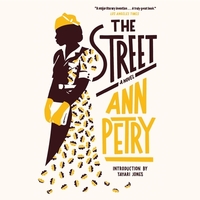You need to sign in or sign up before continuing.
Take a photo of a barcode or cover
Wow, this is an amazing book. I’ve heard of it for years, but never got around to reading it until now. It was published in 1946, six years before “The Invisible Man”, and, like that book, it deals with the hard truths of racism. It also clearly describes the double jeopardy of being Black and female.
There’s nothing dry about this novel. Racism and poverty are visceral, described in the small, windowless spaces in which people live. The people all struggle against this sense that something is closing in on them, something immense and inexorable.
The center of the novel is Lutie Johnson, an African American single mother living in Harlem. She is frustrated by the tremendous effort it takes to get even slightly ahead, in a place where men can’t find work, where women work too hard, where children have nowhere to play, and where crime is a constant. She is determined to get herself and her son, Bub, off this street and into a better living situation.
But there are setbacks at every turn, and so Lutie’s anger builds. She deals with two sources of evil. One is the Super of the building where she lives, a hulking man who has spent too much time alone in cellars and furnace-rooms and has no idea how to interact with people. He fantasizes constantly about how to possess Lutie. The other is Junto, the white man who owns some of the local bars and nightclubs, and who has worked out a plan that’s more sophisticated but has the exact same object.
The novel is mostly told through Lutie’s thoughts, but it moves around to other characters, so that we know what many of them are thinking, and some of the experiences that led to these thoughts. We understand her son Bub, and his fear of the dark. We are intimate with the Super’s obsessions, and with Boots, who escapes the indignities of manual labor by working for Junto. And one of the most interesting characters is Min, the woman who lives with the Super and who goes to a root doctor for medicine to help her keep her place in his house. We experience how this medicine works from both sides, and it’s compelling.
The plot is masterful, with suspense building up to an ending that’s surprising and yet seems inevitable.
Some quotes:
< Streets like the one she lived on were no accident. They were the North’s lynch mobs, she thought bitterly; the method the big cities used to keep Negroes in their place. And she began thinking of Pop unable to get a job; of Jim slowly disintegrating because he, too, couldn’t get a job, and of the subsequent wreck of their marriage; of Bub left to his own devices after school. From the time she was born, she had been hemmed into an ever-narrowing space, until now she was very nearly walled in and the wall had been built up brick by brick by eager white hands. >
Here, Ann Petry describes Lutie in despair, after her son is picked up by the police.
< She leaned further against the wall, seemed almost to sink into it, and started to cry. The hall was full of the sound. The thin walls echoed and re-echoed with it two, three floors below and one floor above.
People coming home from work heard the sound when they started up the first flight of stairs. Their footsteps on the stairs, slowed down, hesitated, came to a full stop, for they were reluctant to meet such sorrow head-on. By the time they reached the fourth floor and actually saw her, their faces were filled with dread, for she was pounding against the wall with her fists – a soft, muted, dreadful sound. Her sobbing heard close to made them catch their breaths. She held the crisp, crackling white paper in her hand. And they recognized it for what it was – a symbol of doom – for the law and bad trouble were in the long white paper. They knew, for they had seen such papers before.
They turned their faces away from the sight of her, walked faster to get away from the sound of her. They hurried to close the doors of their apartments, but her crying came through the flimsy walls, followed them through the tight-shut doors.
All through the house radios went on full blast in order to drown out this familiar, frightening, unbearable sound. But even under the radios they could hear it, for they had started crying with her when the sound first assailed their ears. And now it had become a perpetual weeping that flowed through them, carrying pain and a shrinking from pain, so that the music and the voices coming from the radios couldn’t possibly shut it out, for it was inside them. >
This is not a "feel good" book, for white folks. This a "think hard about systemic racism, and do better" book.
Set in Harlem in the late 1940's, Lutie Johnson just wants a decent life for herself and her eight year old son. Her marriage destroyed, mostly by racism, her options limited (by racism), it seems like at every turn, there's a roadblock. She's smart, hardworking, determined. A compelling, sympathetic character - but the author manages to make ALL of the characters sympathetic in some way.
The writing is brilliant.
"They issued orders to some point over her head until sometimes she was tempted to look up to see if there was another head on top of her own—a head she had grown without knowing it."
Why is this still, below, so relevant? I hate that this is still so relevant.
"If you looked at them from inside the framework of a fat weekly salary, and you thought of colored people as naturally criminal, then you didn’t really see what any Negro looked like. You couldn’t, because the Negro was never an individual. He was a threat, or an animal, or a curse, or a blight, or a joke."
Fellow white folks, we MUST do better. Read this - and take action. My Black friends, if you've missed this gem, do read it for its brilliance, but also, get some emotional support because it will probably hit you hard.
Set in Harlem in the late 1940's, Lutie Johnson just wants a decent life for herself and her eight year old son. Her marriage destroyed, mostly by racism, her options limited (by racism), it seems like at every turn, there's a roadblock. She's smart, hardworking, determined. A compelling, sympathetic character - but the author manages to make ALL of the characters sympathetic in some way.
The writing is brilliant.
"They issued orders to some point over her head until sometimes she was tempted to look up to see if there was another head on top of her own—a head she had grown without knowing it."
Why is this still, below, so relevant? I hate that this is still so relevant.
"If you looked at them from inside the framework of a fat weekly salary, and you thought of colored people as naturally criminal, then you didn’t really see what any Negro looked like. You couldn’t, because the Negro was never an individual. He was a threat, or an animal, or a curse, or a blight, or a joke."
Fellow white folks, we MUST do better. Read this - and take action. My Black friends, if you've missed this gem, do read it for its brilliance, but also, get some emotional support because it will probably hit you hard.
Completely undervalued work. Petry is comparable to Virginia Wolfe in detail, and a master of emotion.
I can’t take animal cruelty, sorry. It was a no no for me.
a good plot, but it was so long and so wordy. just... could've been condensed so much. buuuut good enough to read for class!
dark
emotional
sad
tense
slow-paced
Plot or Character Driven:
A mix
Strong character development:
Yes
Loveable characters:
Complicated
Diverse cast of characters:
Yes
Flaws of characters a main focus:
Yes
"The Street" was a great read, and I really enjoyed it. However, there are some flaws in regards to story/plot development. Overall, I would recommend this book to anyone who's looking for a nontraditional book in terms of plot. This book definitely took a turn I didn't expect, and the ending had me speechless and heartbroken. A good book causes you to feel emotion, and I absolutely felt emotion... from empathy and sadness to fear and disgust.
challenging
emotional
slow-paced
Plot or Character Driven:
A mix
Strong character development:
Yes
Loveable characters:
Complicated
Diverse cast of characters:
Yes
Flaws of characters a main focus:
Complicated






